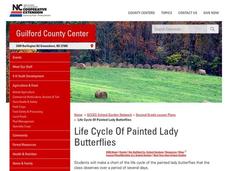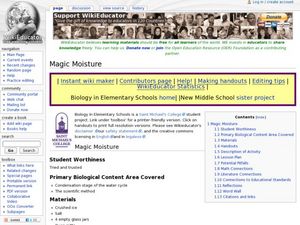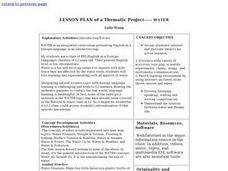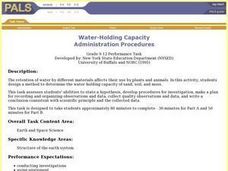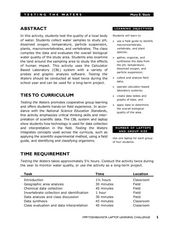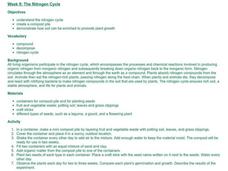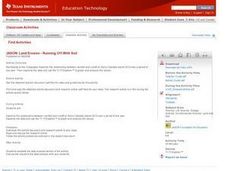NC Cooperative Extension, Guilford County Center
Life Cycle Of Painted Lady Butterflies
The Very Hungry Caterpillar is the inspiration for this project-based learning activity. Kindergartners create a lifecycle chart for a butterfly with four sections: egg, caterpillar, pupa, and butterfly. It is a three-dimensional...
Illinois Department of Natural Resources
Section Two: Why is Biodiversity Important?
Explore soil, genetic traits, natural resources, and pollution in a series of lessons that focus on biodiversity. Kids complete experiments to learn more about the importance of varied genes and organisms in an ecosystem.
Curated OER
Magic Moisture
Learners discover the process of condensation. In this experimental lesson, students hypothesize and conduct an experiment to determine where the water comes from during condensation.
Curated OER
Barometer Investigation
Learners construct a barometer to use in an experiment that they design to measure the air pressure on a daily basis. These observations of air pressure allow students to determine how weather is affected when a storm is approaching and...
American Chemical Society
Evaporation
This is one in several lessons that explore the relationship between temperature and phase changes of water. After some discussion, elementary physical scientists place wet paper toweling on a hot and a room-temperature water bag...
American Chemical Society
Exploring Moisture on the Outside of a Cold Cup
As a stand-alone or as part of the intended unit, this is a valid investigation of what causes condensation to occur. By limiting the amount of air around a cold cup of water and comparing it to one out in the open, they find that...
Curated OER
Plant Transpiration
Students conduct various experiments to investigate plant transpiration. In this biology lesson, students explain how this process helps maintain the hydrologic cycle. They measure the rate of water loss in plants using a potometer.
Curated OER
Life Cycles
Third graders investigate the stages of animal life cycles. They examine an egg and compare it to an inanimate object, read a booklet about the life cycle and define key vocabulary terms, and observe a mealworm. Students then design a...
Curated OER
Lesson Plan of a Thematic Project - Water
Sixth graders investigate the properties of water. In this life science lesson, 6th graders create a concept map of water. They share their work with the class.
Curated OER
Water-Holding Capacity
Students design and conduct an experiment to compare the water-holding capacity of sand, soil, and moss. They measure the change in weight for each material after adding the same amount of water to each material.
Curated OER
Physical Changes and States of Matter
Fourth graders identify a physical change as one that results in a change in size, shape, or state of matter. After an initial teacher-led discussion and demonstration, groups of students get together to perform an experiment which...
Curated OER
Science: The Water Cycle
Students examine the various stages of the water cycle. In groups, they complete a hands-on activity by creating model water cycle. Students design posters representing each of the seven stages of the water cycle.
Curated OER
Testing the Waters
Students explore water in depth through discussion, research, and experiment. Students apply map skills to locating particular regions of the world as they relate to water. Students predict water quality based on information researched...
Berkshire Museum
The Three Life-Giving Sisters: Plant Cultivation and Mohican Innovation
Children gain first-hand experience with Native American agriculture while investigating the life cycle of plants with this engaging experiment. Focusing on what the natives called the Three Sisters - corn, beans, and squash - young...
Curated OER
Water Flow Through Local Soils
Students examine the relationship between particle size and rate of water flow through soil. They collect soil samples, make predictions, conduct a water flow experiment, analyze the data, and answer conclusion questions.
Curated OER
Diurnal Cycling Experiments
Students carry out an experiment to monitor diurnal fluctuations in dissolved oxygen, carbon dioxide, pH, and water temperature. They determine the CO2 and pH of the samples (and optionally, dissolved oxygen). Students complete their...
Curated OER
PLANT LIFE CYCLES
Student learns about the life cycle of plants by watching a time-lapse video. This activity provides students with further evidence that all living things grow and change as they progress through their life cycle.
Curated OER
Animal Life Cycles
Students participate in numerous activities to gather information about parts of the life cycle. In this life science lesson, the teacher choose from a number of activities to create or support an interdisciplinary unit about the life...
Curated OER
The Life Cycle of a Butterfly
Students complete lessons on a butterfly life cycle, moon phases, hot water, and shadows. For this science lesson plan, students complete activities where they read books, look at demonstrations, and complete experiments.
Curated OER
Water Pollution and Food Chains
Sixth graders study the effect of pollution in our food chains. In this plant biology instructional activity, 6th graders first experiment with pollution by placing a carnation in colored water. Next they use a food chain...
Curated OER
The Nitrogen Cycle
Learners design and create a compost pile in order to study the Nitrogen Cycle. They then use the scientific method to determine if plants grow better when they add organic matter from their compost pile to the plant's soil.
Curated OER
Where Did the Water Go? An Investigation in Scientific Methods
Students view a teacher demonstration that prompts them to solve a problem using the scientific method. In this scientific method lesson, students guess which cup has water and are presented with a conundrum when the water does not...
Curated OER
Carbon Cycle Lesson
Seventh graders learn how trees help nature recycle. In this carbon cycle lesson, 7th graders view a picture of a giant redwood tree, complete a Think, Pair, Share activity, view and discuss a poster about how nature recycles,...
Texas Instruments
Land Erosion - Running Off With Soil
Learners evaluate the relationship between rainfall and runoff of a small island for one year. In this rainfall vs. runoff lesson, young scholars analyze the relationship between the rainfall and the runoff on Barro Colorado Island over...
